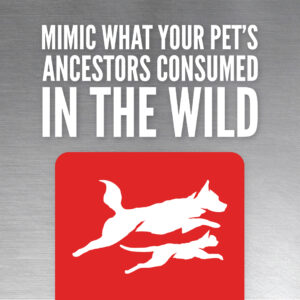WHAT DOES WHOLEPREY MEAN?

If you’re a Pet Lover and you’ve fed your dog or cat ORIJEN™ pet food, you’ve likely seen or heard of the term “WholePrey”. Because we use so many WholePrey animal ingredients in our pet food, we want to help you better understand what WholePrey nutrition is and why it’s so good for your pet!
What is WholePrey pet food?
WholePrey refers to using the whole part of the animal when we add animal ingredients to our pet food. It means we not only use muscle meat like meat, poultry or fish, but we also ensure we include the animal’s organs like heart and liver, as well as some mineral-rich bones.
Why use WholePrey?
Dogs are facultative carnivores, meaning they do best on a meat, poultry or fish based diet, and cats are obligate carnivores, meaning they absolutely require a meat, poultry or fish based diet. Dogs and cats also have a short digestive tract that means meat is easier for them to digest.
 In the wild, your pet’s ancestors consumed all parts of the prey. Because we craft Biologically Appropriate recipes, our ingredients mirror the quantity, freshness and variety of animal ingredients that dogs and cats are evolved to eat. We try to mimic this by adding WholePrey inclusions to ORIJEN diets. These WholePrey inclusions provide many of the nutrients and minerals cats and dogs need to be their best. This includes muscle meat from meat, poultry or fish which is rich in amino and fatty acids, organs that are packed with almost every nutrient a dog or cat needs, as well as smaller amounts of bones for a natural source of minerals.
In the wild, your pet’s ancestors consumed all parts of the prey. Because we craft Biologically Appropriate recipes, our ingredients mirror the quantity, freshness and variety of animal ingredients that dogs and cats are evolved to eat. We try to mimic this by adding WholePrey inclusions to ORIJEN diets. These WholePrey inclusions provide many of the nutrients and minerals cats and dogs need to be their best. This includes muscle meat from meat, poultry or fish which is rich in amino and fatty acids, organs that are packed with almost every nutrient a dog or cat needs, as well as smaller amounts of bones for a natural source of minerals.
The Benefits of WholePrey Nutrition
Your dogs and cats love the taste of WholePrey inclusions, and these ingredients also help support key health benefits through naturally occurring nutrients. As an example, WholePrey animal ingredients are often packed with nutrients like Omega 3 & 6 fatty acids, EPA & DHA, Taurine and Vitamin A.
Our dog and cat diets each include a variety of WholePrey inclusions from different animal sources to meet their unique nutritional needs. This variety of WholePrey ingredients maximises the nutrients your pet gets, giving them the varied nutrition to truly thrive. Every ORIJEN recipe includes a variety of fresh or raw* ingredients from multiple animal sources to provide your pet with the nourishment they need!
How to Find WholePrey Nutrition
Always look at the ingredients panel for fresh or raw whole animal ingredients like chicken, lamb and beef. Then look further to see if there are fresh or raw nourishing organs from that same animal, like chicken hearts or beef liver. The mineral-rich bone comes from ingredients like dehydrated chicken. If you don’t see all three ingredients on the panel, that diet likely isn’t WholePrey.
We hope that helped answer some of your burning questions about WholePrey inclusions, and why we include them in your dog or cat’s diet. We believe it helps them reach the pinnacle of nourishment, and we think your pets would agree!








